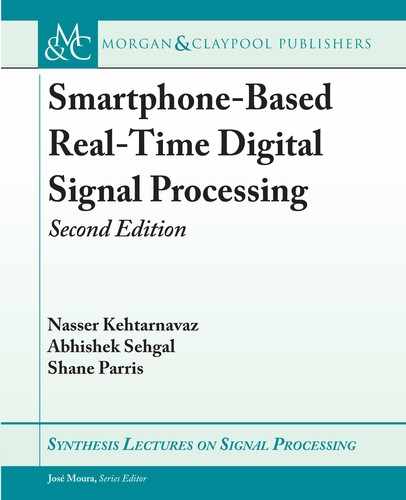
Smartphone-Based
Real-Time Digital
Signal Processing
Second Edition
Nasser Kehtarnavaz
Abhishek Sehgal
Shane Parris
Series Editor: José Moura, Carnegie Mellon University
Smartphone-Based Real-Time Signal Processing
Second Edition
Nasser Kehtarnavaz, University of Texas at Dallas
Abhishek Sehgal, University of Texas at Dallas
Shane Parris, University of Texas at Dallas
Real-time or applied digital signal processing courses are oered as follow-ups to conventional or theory-oriented digital signal
processing courses in many engineering programs for the purpose of teaching students the technical know-how for putting
signal processing algorithms or theory into practical use. ese courses normally involve access to a teaching laboratory that is
equipped with hardware boards, in particular DSP boards, together with their supporting software. A number of textbooks have
been written discussing how to achieve real-time implementation on these hardware boards. is book discusses how to use
smartphones as hardware boards for real-time implementation of signal processing algorithms as an alternative to the hardware
boards that are used in signal processing laboratory courses. e fact that mobile devices, in particular smartphones, have
become powerful processing platforms led to the development of this book enabling students to use their own smartphones to
run signal processing algorithms in real-time considering that these days nearly all students possess smartphones. Changing
the hardware platforms that are currently used in applied or real-time signal processing courses to smartphones creates a
truly mobile laboratory experience or environment for students. In addition, it relieves the cost burden associated with using
dedicated signal processing boards noting that the software development tools for smartphones are free of charge and are well-
maintained by smartphone manufacturers. is book is written in such a way that it can be used as a textbook for real-time or
applied digital signal processing courses oered at many universities. Ten lab experiments that are commonly encountered in
such courses are covered in the book. is book is written primarily for those who are already familiar with signal processing
concepts and are interested in their real-time and practical aspects. Similar to existing real-time courses, knowledge of C
programming is assumed. is book can also be used as a self-study guide for those who wish to become familiar with signal
processing app development on either Android or iPhone smartphones.
A zipped le of the codes discussed in the book can be acquired via the website:
https://sites.fastspring.com/bookcodes/product/SignalProcessingBookcodesSecondEdition
About SYNTHESIS
This volume is a printed version of a work that appears in the Synthesis
Digital Library of Engineering and Computer Science. Synthesis
books provide concise, original presentations of important research and
development topics, published quickly, in digital and print formats.
Series ISSN: 1932-1236
store.morganclaypool.com
KEHTARNAVAZ • ET AL SMARTPHONE-BASED REAL-TIME SIGNAL PROCESSING, SECOND EDITION
morgan & claypool
Smartphone-Based Real-Time
Digital Signal Processing
Second Edition

Synthesis Lectures on Signal
Processing
Editor
Joseé Moura, Carnegie Mellon University
Synthesis Lectures in Signal Processing publishes 80- to 150-page books on topics of interest to signal
processing engineers and researchers. e Lectures exploit in detail a focused topic. ey can be at
different levels of exposition—from a basic introductory tutorial to an advanced
monograph—depending on the subject and the goals of the author. Over time, the Lectures will
provide a comprehensive treatment of signal processing. Because of its format, the Lectures will
also provide current coverage of signal processing, and existing Lectures will be updated by authors
when justified.
Lectures in Signal Processing are open to all relevant areas in signal processing. ey will cover theory
and theoretical methods, algorithms, performance analysis, and applications. Some Lectures will
provide a new look at a well established area or problem, while others will venture into a brand new
topic in signal processing. By careful reviewing the manuscripts we will strive for quality both in the
Lectures’ contents and exposition.
Smartphone-Based Real-Time Digital Signal Processing, Second Edition
Nasser Kehtarnavaz, Abhishek Sehgal, and Shane Parris
2018
Anywhere-Anytime Signals and Systems Laboratory: From MATLAB to Smartphones,
Second Edition
Nasser Kehtarnavaz, Fatemeh Saki, and Adrian Duran
2018
Anywhere-Anytime Signals and Systems Laboratory: From MATLAB to Smartphones
Nasser Kehtarnavaz and Fatemeh Saki
2016
Smartphone-Based Real-Time Digital Signal Processing
Nasser Kehtarnavaz, Shane Parris, and Abhishek Sehgal
2015
An Introduction to Kalman Filtering with MATLAB Examples
Narayan Kovvali, Mahesh Banavar, and Andreas Spanias
2013
iii
Sequential Monte Carlo Methods for Nonlinear Discrete-Time Filtering
Marcelo G.S. Bruno
2013
Processing of Seismic Reflection Data Using MATLAB™
Wail A. Mousa and Abdullatif A. Al-Shuhail
2011
Fixed-Point Signal Processing
Wayne T. Padgett and David V. Anderson
2009
Advanced Radar Detection Schemes Under Mismatched Signal Models
Francesco Bandiera, Danilo Orlando, and Giuseppe Ricci
2009
DSP for MATLAB™ and LabVIEW™ IV: LMS Adaptive Filtering
Forester W. Isen
2009
DSP for MATLAB™ and LabVIEW™ III: Digital Filter Design
Forester W. Isen
2008
DSP for MATLAB™ and LabVIEW™ II: Discrete Frequency Transforms
Forester W. Isen
2008
DSP for MATLAB™ and LabVIEW™ I: Fundamentals of Discrete Signal Processing
Forester W. Isen
2008
e eory of Linear Prediction
P. P. Vaidyanathan
2007
Nonlinear Source Separation
Luis B. Almeida
2006
Spectral Analysis of Signals: e Missing Data Case
Yanwei Wang, Jian Li, and Petre Stoica
2006
..................Content has been hidden....................
You can't read the all page of ebook, please click here login for view all page.
